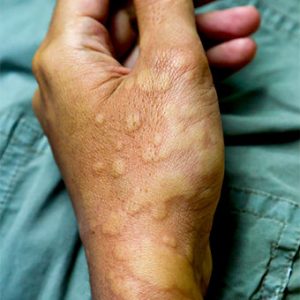Gut and Diet Often Important to Diagnosing Skin Issues
Kudos to Dermatologist Kenneth Beer for making the gut-diet-skin connection!
- Newsmax, Monday, 16 Oct 2017
 As a dermatologist, I have only a passing knowledge of gastrointestinal issues. However, I find that the gut increasingly is an issue for my patients. Whether they are complaining about gluten allergies (which frequently affect the skin when they are severe), or getting over a food borne illness or speaking with me about their digestive issues in the course of a normal conversation. I continue to be fascinated by the interaction between the gut and the mind, by the association between the gut and the skin and by the interaction of what we eat and how we feel. The discussion about diabetes and the skin is the topic of a separate article.
As a dermatologist, I have only a passing knowledge of gastrointestinal issues. However, I find that the gut increasingly is an issue for my patients. Whether they are complaining about gluten allergies (which frequently affect the skin when they are severe), or getting over a food borne illness or speaking with me about their digestive issues in the course of a normal conversation. I continue to be fascinated by the interaction between the gut and the mind, by the association between the gut and the skin and by the interaction of what we eat and how we feel. The discussion about diabetes and the skin is the topic of a separate article.
First, the association between gluten intake and the skin. While I think that the gluten sensitivity issue may be exaggerated, there is definitely a link between gluten and the skin in addition to the link between gluten and the gut. Dermatologists have long known this and have described a disease called dermatitis herpetiformis that combines itchy rashes with gluten sensitivity in many people (in some, the rash can be present without the digestive component and vice versa).
Readers may be interested in reading, Celiac Disease Has a Little Sister by The Celiac Scene
 From an evolutionary point of view, there are likely people who descended from ancestors that were regions where wheat was not plentiful and who developed sensitivities to it when they were exposed to it. For those suffering from dermatitis herpetiformis, they frequently see itchy bumps on the backs of their arms and on many other parts of their skin. The itching can be devastating and until it is treated, can have a material impact on the quality of life. I have seen several of these patients over the past decade and in many instances, the initial rash did not look typical. For these patients, it took some time and several biopsies to discover the underlying problem.
From an evolutionary point of view, there are likely people who descended from ancestors that were regions where wheat was not plentiful and who developed sensitivities to it when they were exposed to it. For those suffering from dermatitis herpetiformis, they frequently see itchy bumps on the backs of their arms and on many other parts of their skin. The itching can be devastating and until it is treated, can have a material impact on the quality of life. I have seen several of these patients over the past decade and in many instances, the initial rash did not look typical. For these patients, it took some time and several biopsies to discover the underlying problem.
Once discovered, the elimination of gluten from the diet may help the itch to resolve and allow the person to resume a normal life. If it goes untreated, the burden that itching can have is significant: in many instances, the disruption of their lives results in significant depression and anxiety. Fortunately, treatments for this entity are pretty good and usually well tolerated. There are other patients for whom gluten intake will cause a rash but that do not have dermatitis herpetiformis. There may or may not be evidence of antibodies in the skin. For some of these, it may be possible to diagnose the sensitivity by doing a blood test and/or an elimination diet.
 Some of my patients will itch for reasons that are not clear. Most of them will have undiscovered causes even after extensive evaluations at academic dermatology departments. However, if one tracks what they eat with flares of their skin problems, at times it is possible to find something they are allergic to. Hives are common for many people. For the majority, they are self-limiting and go away. For others, they persist and can be extremely debilitating. In some of these people, eliminating raspberries, strawberries, shellfish, and the dyes and fragrances found in many food ingredients including tomato sauce can make a dramatic change in the course of their disease.
Some of my patients will itch for reasons that are not clear. Most of them will have undiscovered causes even after extensive evaluations at academic dermatology departments. However, if one tracks what they eat with flares of their skin problems, at times it is possible to find something they are allergic to. Hives are common for many people. For the majority, they are self-limiting and go away. For others, they persist and can be extremely debilitating. In some of these people, eliminating raspberries, strawberries, shellfish, and the dyes and fragrances found in many food ingredients including tomato sauce can make a dramatic change in the course of their disease.
Some of my patients will discuss non-skin issues with me. I am surprised at the number of patients who complain about food borne illness. According to a 2009 article in the New England Journal of Medicine (DuPont, Herbert. N Engl J Med 2009; 361: 1560-9), I should not be. This article states that “the increased consumption of fresh vegetables and fruits” as well as the intake of foods from “developing regions” among other factors are associated with bacterial infections. When severe, these infections may cause nutritional deficiencies that affect the skin.
Fortunately, this most of these infections respond to antibiotics but some require multiple courses of treatments or different types of therapy. My advice to patients who mention this to me is to avoid dehydration by drinking fluids and electrolytes. The article from the New England Journal of Medicine suggests eating “bananas, rice, applesauce and toast.” If you have ongoing illness, especially if others who ate with you are ill, get evaluated by their primary care or gastrointestinal doctor. As with everything, there is a website (iwaspoisoned.com) that tracks instances of food poisoning.
 Finally, although it is far afield from dermatology, I am interested in the emerging discussion about FODMAPs. These are dietary products that can cause flares of irritable bowel or irritate the gut. FODMAPs are fermentable oligosaccharides, disaccharides, monosaccharides and polyols. There are now many diets that are available that are low in these ingredients. In addition to avoiding these ingredients, the addition of probiotics may help to calm the gut.
Finally, although it is far afield from dermatology, I am interested in the emerging discussion about FODMAPs. These are dietary products that can cause flares of irritable bowel or irritate the gut. FODMAPs are fermentable oligosaccharides, disaccharides, monosaccharides and polyols. There are now many diets that are available that are low in these ingredients. In addition to avoiding these ingredients, the addition of probiotics may help to calm the gut.
Dermatology is a specialty that frequently sees patients for decades. During that time, we get to know a lot about our patients (and vice versa). For those with itching that seems to have no source, dietary interventions may prove to be helpful. For those who have issues with their gut, consultation with a gastrointestinal specialist may be in order.
*Read the original article: https://www.newsmax.com/KennethBeer/skin-dermatology-gut-diet/2017/10/16/id/819945/

- Kenneth Beer, MD is a board certified dermatologist and dermatopathologist in West Palm Beach and Jupiter, Florida (www.beerdermatology.com). He was an AB Duke Scholar at Duke University and then attended medical school at The University Of Pennsylvania. After completing a year of internal medicine in Philadelphia, he trained in dermatology at The University of Chicago. Dr. Beer has volunteered at the University of Miami for more than 20 years and believes strongly in their mission of providing healthcare. He is actively involved in clinical research for cosmetic medicine, general dermatology and skin cancer. He blogs at Newsmax to discuss issues that pertain to the skin as well as to healthcare in general. To read more of his reports — Click Here Now.













